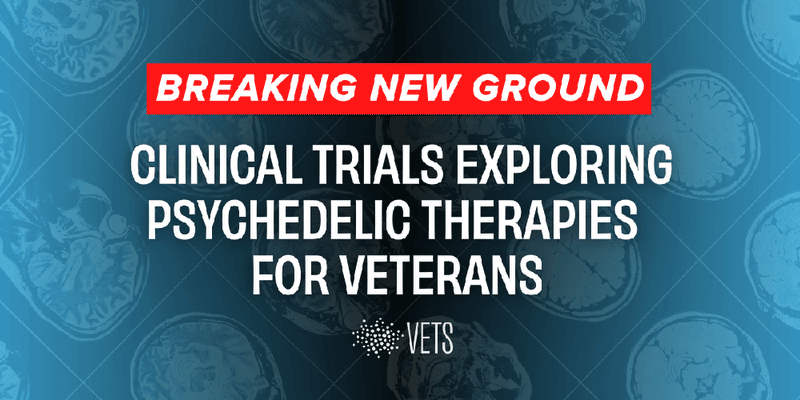By DaisyMae VanValkenburgh-Haftel, VETS Marketing Manager
The veteran population has unique mental health needs that too often go unmet by traditional treatment options. PTSD, depression, substance use disorders, and traumatic brain injuries are deeply rooted issues that affect scores of former service members. But a new wave of research is breaking through the limitations of traditional medicine—ushering in hope through innovative clinical trials centered on psychedelic-assisted therapies.
At the forefront of this movement is a growing body of clinical research supported by institutions across the United States, including leading universities, VA healthcare systems, and private research centers.
These studies are investigating the potential of psychedelic compounds like psilocybin, MDMA, ketamine, and ibogaine to treat the invisible wounds of war with care, science, and empathy.
Why Psychedelics? Why Now?
Psychedelics are not new to human history, but their resurgence in modern medicine is rooted in rigorous science and compassionate care. For veterans who have tried traditional therapies with limited success, psychedelic-assisted therapy offers a fundamentally different approach—one that emphasizes healing through self-awareness, emotional release, and deeply personal experiences facilitated in a safe, clinical setting.
The federal government, academic institutions, and bipartisan lawmakers are taking note. For instance, in 2022, Texas passed HB 1802
with overwhelming support, funding a groundbreaking study on psilocybin-assisted therapy for PTSD in veterans.
A Look at the Frontlines of Psychedelic Research for Veterans
Here are some of the leading clinical trials you should know about:
Psilocybin for PTSD - Baylor College of Medicine
Led by Dr. Lynnette Averill, this Texas state-funded study explores two doses of psilocybin combined with preparation and integration sessions. It’s a landmark trial supported by HB 1802—designed exclusively for veterans with PTSD. Click here to participate in the pre-screener for consideration in this study.
MDMA-facilitated Couples Therapy - San Diego VA
This study examines MDMA-assisted cognitive behavioral conjoint therapy (bCBCT) for veterans and their partners. The innovative protocol invites partners into the healing journey alongside the veteran receiving MDMA, integrating psychedelic therapy into the CBCT model for couples counseling. The therapy is designed with the goal of improving both PTSD symptoms and relationship dynamics in couples impacted by trauma.
Psilocybin vs. Ketamine for Alcohol Use Disorder - University of Iowa
In this comparative trial , researchers explore how psilocybin and ketamine-assisted therapies affect veterans struggling with alcohol dependency—a critical issue in post-service life.
Psychedelic Survey for Veterans - Johns Hopkins University
A national survey is gathering data from veterans with prior psychedelic experience to better understand how these substances impact PTSD, depression, and other psychiatric conditions.
MDMA for Combat-Related, Treatment-Resistant PTSD - VA Loma Linda Health Care System, Loma Linda, CA
This pilot program focuses on veterans who’ve found traditional PTSD treatments ineffective, exploring how MDMA-assisted psychotherapy could offer long-term relief. Please note: This study is no longer actively recruiting participants.
Transcendental Meditation for PTSD - National Multi-Site Study
Not all trials involve psychedelics. This study compares Transcendental Meditation (TM) and Present Centered Therapy (PCT) for veterans and first responders—offering non-pharmacological pathways to healing.
Psilocybin for Co-occurring Depression & Alcohol Use - Johns Hopkins University
This double-blind, placebo-controlled study evaluates how high-dose psilocybin affects veterans with both major depressive disorder (MDD) and alcohol use disorder (AUD). It’s a cutting-edge look at dual-diagnosis treatment.
Ibogaine for Special Operations Veterans - University of Texas at Austin
Ibogaine is a powerful, naturally occurring psychedelic with potential to rewire neural pathways. This study examines its use among Special Operations veterans suffering from complex mental health conditions.
How Veterans Can Get Involved
Participation in clinical trials is a personal choice, but for many veterans, it’s a lifeline—and a chance to not only find healing but contribute to groundbreaking science that could change the future of healthcare for fellow service members.
The VETS website makes it easy to browse current studies , check eligibility requirements, and learn more about the protocols and support systems built into each trial. You can also search broader databases like the NIH Clinical Trials Locator using keywords like veteran, PTSD, or psychedelic.
This is a pivotal moment in veteran healthcare.
Psychedelic-assisted therapies are not a fix-all solution, but they represent a hopeful shift toward more holistic, trauma-informed, and evidence-backed healing methods.
As these clinical trials continue to unfold, they shine a light on one simple truth: veterans deserve innovative care, rooted in science and compassion.
About the Author
DaisyMae VanValkenburgh-Haftel is dedicated to advancing psychedelic therapy through strategic marketing and digital communications. As Marketing Manager at VETS, she leads digital strategy and email campaigns that amplify the organization’s mission to support veteran healing through psychedelic-assisted therapy.
In 2019, she founded DazeMarie Marketing, a boutique agency specializing in lifestyle, wellness, and psychedelic therapy. Her global client roster includes clinics, retreats, researchers, nonprofits, and mental health professionals committed to transforming the future of care. Her work is rooted in a deep passion for transforming mental health care and making breakthrough therapies more accessible to those who need them most.
DaisyMae holds a B.A. in Communications and Global Studies from Hofstra University and a certification in U.S. Government from Harvard.

